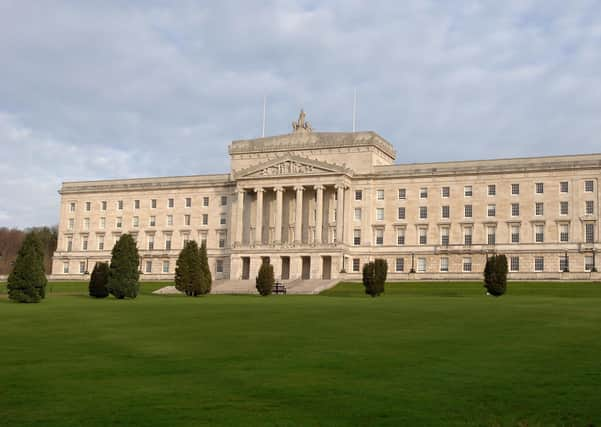It is striking just how badly Northern Ireland did last year in both Covid’s toll and economic recession, with output fall among worst in world


In terms of the human cost of coronavirus 1,300-1,700 deaths, depending on the method of measurement.
Northern Ireland along with the rest of the UK suffered a mortality rate which was well above the average for western or industrialised countries.
Advertisement
Hide AdAdvertisement
Hide AdIn terms of the economic recession associated with the virus, the scale of output decline in NI was one of the worst in the world.


At various points during 2020 there was some dispute about how to balance health and economic priorities. Unfortunately, the final outcome with regard to both was dire.
As to 2021, economic recovery will start but it now looks as though this won’t be until well into the year. Perhaps not until the second half of the year.
The Northern Ireland Executive was far from unique in finding responding to the virus very challenging — governments around the globe have struggled.
Advertisement
Hide AdAdvertisement
Hide AdIt started off from a position a year ago which was already very unfavourable. It had only just been restored after three years of suspension and gap between its aspirations and fiscal resources was already huge.
Nevertheless, the virus has shone a light on just how difficult this particular model of regional government finds it to make policy both in terms of immediate priorities and longer term strategic objectives.
Part 1: Dismal outcomes during 2020
It is striking is just how badly Northern Ireland (NI) has done in terms of both Covid’s human toll and in terms of the scale of economic recession.
The American University Johns Hopkins provides a comprehensive and up-to-date data base relating to coronavirus.
Advertisement
Hide AdAdvertisement
Hide AdOf the 171 countries considered in that data base, as of late December 2020, only 35 had a higher cumulative covid death rate (deaths of those with a positive test) than NI.
The remaining 136 had a lower rate.
It is true, as of late December, NI’s cumulative death rate was still about one-third less than the UK average (though during this second wave it has been catching up rapidly).
Given that NI has a much lower population density and much lower ethnic minority population representation than England it would probably be expected to have a lower rate than the rest of the UK.
In the Johns Hopkins database of thetotal number of deaths of persons with a positive test in late December per 100,000 of population Northrn Ireland was 64, compared to 163 in the worst hit country, Belgium.
Advertisement
Hide AdAdvertisement
Hide AdThe figure was 102 in the UK as a whole, 97 in the US, 44 in the Republic of Ireland, and went all the way down to the least badly hit countries, New Zealand 0.5, Singapore 0.5 and Taiwan 0.03.
Strikingly, NI’s cumulative death rate as of December 21 was about twice that in Canada, Israel, Germany and Slovakia.
Three times that in Latvia. Four times that in Denmark and Estonia.
Seven times that in Finland and Iceland.
Eight times that in Norway. 17 times that in Australia and 29 times that in Japan. 130 times that in New Zealand and Singapore and roughly 2,000 times that in Taiwan.
Advertisement
Hide AdAdvertisement
Hide AdIn November/December most forecasters agreed that the UK economy would experience a decline in GDP in 2020 of about 11%.
Given that restrictions have tightened since then and given that NI has a larger representation of especially vulnerable sectors (non-food retail, aerospace manufacturing) it is quite likely that the NI economy will experience an output decline in 2020 of about 12%, possibly even 12-14%.
If that is the case NI, like the rest of the UK, will have experienced an even deeper recession that most other world economies.
It is worth stressing that this year’s economic blow came on top of chronic under-performance.
Advertisement
Hide AdAdvertisement
Hide AdDuring the 100 years of the existence of the state of Northern Ireland the economic growth rate in the region has generally lagged behind that in many other parts of the world (there is some comfort but only some from realising that during the same period NI’s economic growth rate did exceed the UK average although not be a very large margin).
Whereas 100 years ago the level of GDP per person in NI was substantially above that in range of countries including Norway, Finland, Spain, Italy, Japan, Czech Republic, Slovenia, Israel, Malaysia and Taiwan, by 2018 these had all far surpassed NI.
It is sometimes argued that GDP is an imperfect measure of well-being and to an extent that is true.
Nevertheless, the fact that NI fell behind so many other countries must be significant and it is probable many of those countries also exceeded NI on various dimensions of quality of life: as we’ve already seed most of them certainly performed much better in terms of containing the virus.
Part 2: What about 2021?
Advertisement
Hide AdAdvertisement
Hide AdIf we’ve learnt anything from 2020 it should be the peril of making precise (or point) predictions about the future- that future is inherently uncertain.
That said, some degree of economic recovery is very likely in 2021 but the onset of that recovery will probably be delayed until well into the year.
Much now depends on the race between further waves of infection relative to the pace of vaccination.
The Stormont executive will continue to struggle in this early part of the year.
Advertisement
Hide AdAdvertisement
Hide AdThe virus has further widened the gap between aspirations and resources, almost inevitably the urgent has been allowed to crowd out significant longer term priorities.
A number of the commitments outlined in last January New Decade New Approach document are unrealised.
It would not be unreasonable to expect 2021’s executive to display some proper collective, cabinet responsibility.
Past experience suggests this will not happen.
The staff within NI’s NHS deserve every commendation for the way they rose to the challenge of Covid.
Advertisement
Hide AdAdvertisement
Hide AdUnfortunately, the virus also revealed the structural weaknesses of the NHS particularly in terms of how quickly it began to face capacity issues.
That lack of capacity is not just a question of inadequate funding — for years repeated Stormont administrations failed to grasp the nettle of reforming the structures of healthcare in Northern Ireland.
Questions of analysing what worked and didn’t work during the pandemic are probably ones for the medium term.
The immediate priority is get the infection rates down by enduring the latest restrictions whilst trying to preserve as much long term economic capacity as possible.
Advertisement
Hide AdAdvertisement
Hide Ad• Dr Esmond Birnie is Senior Economist at the Ulster University Business School
——— ———
A message from the Editor:
Thank you for reading this story on our website. While I have your attention, I also have an important request to make of you.
With the coronavirus lockdown having a major impact on many of our advertisers — and consequently the revenue we receive — we are more reliant than ever on you taking out a digital subscription.
Subscribe to newsletter.co.uk and enjoy unlimited access to the best Northern Ireland and UK news and information online and on our app. With a digital subscription, you can read more than 5 articles, see fewer ads, enjoy faster load times, and get access to exclusive newsletters and content. Visit https://www.newsletter.co.uk/subscriptions now to sign up.
Advertisement
Hide AdAdvertisement
Hide AdOur journalism costs money and we rely on advertising, print and digital revenues to help to support them. By supporting us, we are able to support you in providing trusted, fact-checked content for this website.
Alistair Bushe
Editor